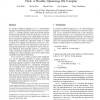Free Online Productivity Tools
i2Speak
i2Symbol
i2OCR
iTex2Img
iWeb2Print
iWeb2Shot
i2Type
iPdf2Split
iPdf2Merge
i2Bopomofo
i2Arabic
i2Style
i2Image
i2PDF
iLatex2Rtf
Sci2ools
113
click to vote
PLDI
1997
ACM
1997
ACM
Flick: A Flexible, Optimizing IDL Compiler
An interface definition language (IDL) is a nontraditional language for describing interfaces between software components. IDL compilers generate “stubs” that provide separate communicating processes with the abstraction of local object invocation or procedure call. High-quality stub generation is essential for applications to benefit from componentbased designs, whether the components reside on a single computer or on multiple networked hosts. Typical IDL compilers, however, do little code optimization, incorrectly assuming that interprocess communication is always the primary bottleneck. More generally, typical IDL compilers are “rigid” and limited to supporting only a single IDL, a fixed mapping onto a target language, and a narrow range of data encodings and transport mechanisms. Flick, our new IDL compiler, is based on the insight that IDLs are true languages amenable to modern compilation techniques. Flick exploits concepts from traditional programming language compil...
Idl Compilers | PLDI 1997 | Programming Languages | Traditional Idl Compilers | Typical Idl Compilers |
| Added | 06 Aug 2010 |
| Updated | 06 Aug 2010 |
| Type | Conference |
| Year | 1997 |
| Where | PLDI |
| Authors | Eric Eide, Kevin Frei, Bryan Ford, Jay Lepreau, Gary Lindstrom |
Comments (0)

